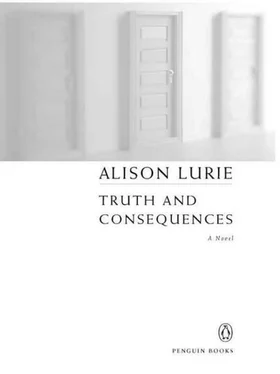“Uh—yeah.” You’re so beautiful, he thought.
“For me, writing is a sensual act. Well, you must know. It’s like that for most artists, isn’t it?” Delia turned slightly away, glancing out of the window as if she saw a procession of artists passing.
“Yeah, you’re probably right,” he agreed, swerving around toward her, his mind blurred by a surge of pain and the impulse toward another sort of sensual act.
“I’m sure I am,” Delia said, stepping away as if she had intuited what he was planning. Her voice had strengthened and lost its murmuring, confiding tone.
“I—you—” Alan uttered inarticulately, putting one hand on the pain in his back.
Delia did not reply. She felt about on the carpet for her shoes, slipped her feet into them, and moved toward her desk.
“You know, I think I’d like to work now,” she said.
“Okay. I’ll let you.” Alan heard a hurt, resentful overtone in his voice. A few moments ago he had felt closer to Delia than to anyone in the world; now she was speaking to him like a polite stranger. Or an impolite one. “Well, so long,” he added, attempting an equal unconcern.
“Mm.” Delia sat down at her desk, drawing a sheet of pale-green paper toward her and picking up a pen. “Oh, I forgot to tell you,” she added casually, glancing up. “I heard from Jacky Herbert yesterday. He really likes your paintings.”
“He likes them?” Alan felt suddenly out of breath
“Mm,” she said after a pause. “He wants to meet you.” Again she turned away,
“He wants to meet me when?”
This time Delia did not even seem to hear. Alan stood for a moment staring at her bare flushed arms and her thick sheaf of hair. As he took a step toward the door, one of the slices of dust-filled sunlight that escaped from between the heavy velvet curtains slashed and suddenly blinded him. Stumbling with suddenly renewed pain, he left the room.
NINE
In a campus coffee shop known as the Red Bear, Jane and Henry Hull were having lunch. It was heavily cloudy outside the window, and damp yellow leaves splattered the lawns, but Jane’s spirits were not cloudy or damp. More and more she looked forward to these lunches, which occurred more and more often. They no longer made her uneasy, since all this time Henry had never made the move she had guiltily desired and dreaded. Clearly she was safe with him: all he wanted was a friend, a friend who also had an invalid spouse.
Mainly they spoke of ordinary subjects—local and national news events, films they had seen, their own histories. Jane now knew that Henry had at one time or another been a waiter, an advertising executive, a counselor of troubled adolescent boys, a taxi driver, and a high school teacher. At present he was a freelance editor. “What that means is, somebody who knows something but can’t write, puts together a book,” he had explained. “It’s on weather forecasting, or city planning, or Colonial history, or whatever. The information is all there, and there are readers who want it—but the prose is clumsy and the organization is confused. So they send the manuscript to me. And the worse it is, the longer it takes, the more they pay.”
As a result of his profession, Henry knew a lot about some unusual subjects. “When I take on a project I sometimes think, Oh, this won’t be very interesting, but I always get hooked. Did you know, for instance, that you can tell whether the moon is waxing or waning by whether its horns point east or west?”
“I did, actually,” Jane had admitted. “You need to know that if you have a garden, because you have to plant aboveground crops when the moon is waxing, and root crops when it’s waning.”
“You really believe that?” Henry said, smiling.
“I don’t know; but I planted my carrots at the wrong time this year, because of Alan’s operation, and they’re not very good—pale and kind of tasteless. That’s why I didn’t bring you any.” Jane had continued giving Henry her excess vegetables, and he in return (in spite of her protests that the vegetables were free) insisted on paying for their lunches.
She had learned that Henry had two grown children by an earlier marriage, both successful yuppies. “I love them, and they love me, but they’re more serious and grown-up than I am by now. Their attitude is, what crazy thing is Dad going to do next? The trouble is, I don’t usually know the answer myself.” Jane, in turn, had confided that she and Alan hadn’t really wanted children.
“Really?” Henry said.
“Well, no. That’s not exactly so,” she amended. “We wanted them, but we didn’t want to adopt. Alan didn’t think he could ever feel the same about a child that wasn’t his.”
“Ah.” Henry gave her a steady look. “And could you?”
“I—” Jane swallowed. “I thought maybe I could,” she admitted. “But it’s not right to have children that one parent won’t ever love.”
“I suppose not,” Henry said slowly. “You know what’s so remarkable about you?” he added. “You always try to say what’s true, not what will make you look good or please the person you’re speaking to.”
Yes, maybe, she had thought. But that’s partly because you’re the person I’m speaking to.
For Jane, the most important subject of their conversation was what Henry had proposed that day by the lake: the problems of being a caregiver. Theoretically she could have spoken of this to her women friends, and in the past she had tried to do so. But their first question was always, “How is Alan doing?” Often it did not occur to them to ask how she was doing. After all, she was perfectly healthy. Only her mother had ever suggested that Jane’s role might not be an easy one. “Yes, it can be hard,” she had told Jane. “You just have to do your duty the best you can.” It was her mother’s standard solution to the problems of life, but one that had begun to work less and less well for Jane.
Even with Henry she had resisted the topic at first. “Really, I shouldn’t complain,” she had said. “It seems so disloyal.”
“Of course you should complain,” Henry had replied. “Besides, if you don’t, I can’t either.”
“Well.” She smiled.
“Do you think I’m disloyal?”
“No. Not really.” In Jane’s opinion, it was quite reasonable to complain about Delia Delaney, a deeply self-centered person whose headaches were, if not wholly fraudulent, certainly manipulative. But Henry never said anything negative about Alan, and she had therefore resolved to refrain from criticizing his wife, though sometimes she almost slipped.
“We both need to let off steam,” Henry said. “It’s better and safer this way. If we don’t, it’s going to explode and burn someone.”
“I guess you’re right,” Jane said. She imagined a cloud of scalding hot steam bursting from his mouth and engulfing Delia. How she would scream, she thought.
“Absolutely.”
Jane had not protested again, though sometimes she would take an awkward step back after revealing the latest problem: today, Alan’s sluggishness about doing the exercises that had been prescribed for his back. “He keeps putting them off, and then when he finally starts he groans so, you can hear it all over the house. He wants me to come running and tell him that he must stop if it’s hurting so much, and bring him a glass of grapefruit juice and his icepacks.”
“It’s like that with Delia too. Misery loves company. I used to think that meant that miserable people love to be with other miserable people. That could be true too, sometimes. But lately I think it mostly means that they need for us to be there and see them suffer, and be miserable too.”
“Well, yes. Sometimes it seems that way,” Jane admitted. “Like last Sunday I was going to have lunch with a friend. I’d told Alan about it the day before, but when I said I was leaving he acted as if I hadn’t. ‘Oh, do you really have to?’ he said. I felt terrible, because I knew he had had a bad night and was in awful pain. And of course I didn’t have to go. I just wanted to.”
Читать дальше







![Кэмерон Доки - Правда и ее последствия[Truth and Consequences]](/books/79610/kemeron-doki-pravda-i-ee-posledstviya-truth-and-con-thumb.webp)




